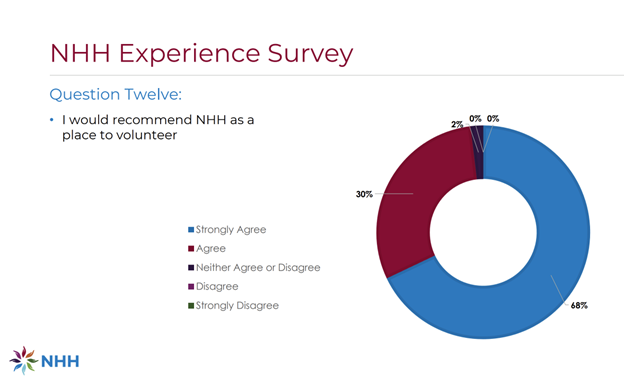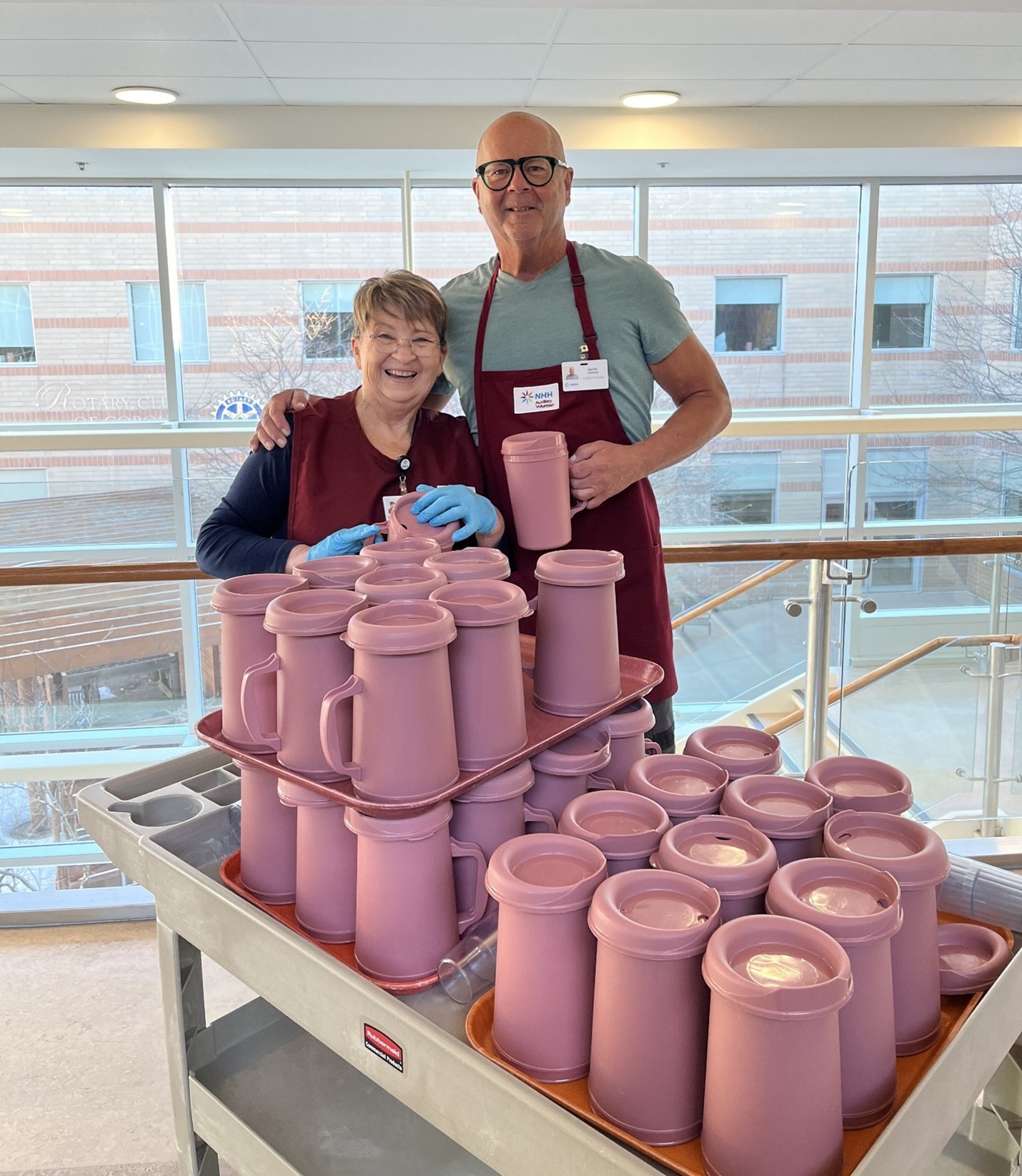Dale, NHH Auxiliary volunteer
By: Jennifer Gillard, Vice President, Patient Experience, Public Affairs and Strategic Partnerships, Northumberland Hills Hospital
At Northumberland Hills Hospital (NHH) in Cobourg, Ontario, volunteers have long played a key role in the community hospital's operation and the delivery of a positive experience for patients, families, staff and providers.
The pandemic brought that fact home, swiftly, when NHH—alongside hospitals across the country—suddenly found itself without the benefit of volunteer hands, heads and hearts.
It is not surprising, then, that resuming volunteer services was an important priority for NHH when pandemic restrictions lifted.
As Patient Experience and Volunteer Appreciation Weeks approach this spring, volunteer activity throughout the hospital is very nearly back to the level it was at prior to COVID's arrival. This strong volunteer presence is a privilege NHH does not take for granted.
Supported by a Volunteer Manager—a hospital resource dedicated to recruiting, training, engaging and assisting volunteers—and a network of volunteer leaders, NHH's volunteer community is, once again, thriving with many distinct branches dedicated to specific roles within the hospital, including: the Auxiliary, whose members support fundraising through two retail operations as well as in-hospital patient supports; the Board of Directors and Community Committee members, who lead hospital governance; the Foundation Board and volunteers, who support capital equipment needs; the Patient and Family Advisory Council, who bring the patient and caregiver voice to continuous quality improvement across the organization; Spiritual Care, who are there for families and staff alike to offer a listening, empathetic ear to those in need; St. John Therapy Dog volunteers, whose four-legged volunteers bring smiles daily to admitted patients; Transplant Ambassadors, who advocate for life-sustaining organ donation; and Integrated Stroke Peer Support volunteers who bring the lived experience of stroke to patients and families navigating a new diagnosis.
This depth and breadth of active volunteer engagement, and recognition for its importance, is pivotal to the People First culture NHH is striving to grow—a culture where everyone feels valued, heard and supported.
In the fall of 2024, as one of the priorities set out in its first Experience Framework, NHH struck an Experience Measurement Working Group to co-design the hospital's first-ever experience survey for volunteers. The goal? To gather feedback, in the same way hospitals have long gathered feedback from patients, staff and physicians, on the experience of volunteers.
Open for feedback from December 4, 2024 through January 16, 2025, the short survey—comprised of 13 questions—was distributed to 307 volunteers active at NHH today. Snip of survey results, taken from final report:

Of the individuals invited to complete the survey, 69 per cent responded, a response rate that exceeded the parallel staff, physician and midwife survey conducted in the same period.
The results provided important baseline data with regard to volunteer demographics, including:
- length of service (35 per cent have volunteered at the hospital for less than 5 years, with 49 per cent reporting 5-20 years of service);
- gender (84 per cent identify as female, 15 per cent male, 1 per cent non-binary);
- ethnicity (96 per cent identify as white, of North American or European ancestry); and
- broader community engagement (42 per cent volunteer elsewhere, in addition to NHH).
 Other key questions measured volunteers' perspectives on hospital values (“At NHH we treat each other with respect" – 75 per cent of volunteers strongly agreed, 22 per cent agreed), the effectiveness of efforts to engage volunteers as part of the team (“I am involved in decisions that impact my volunteer efforts at NHH" – 29 per cent strongly agreed, 38per cent agreed) and volunteer orientation and training (“NHH provides the training, resources and environment to enable my success as a volunteer" – 47 per cent strongly agreed, 44 per cent agreed).
Other key questions measured volunteers' perspectives on hospital values (“At NHH we treat each other with respect" – 75 per cent of volunteers strongly agreed, 22 per cent agreed), the effectiveness of efforts to engage volunteers as part of the team (“I am involved in decisions that impact my volunteer efforts at NHH" – 29 per cent strongly agreed, 38per cent agreed) and volunteer orientation and training (“NHH provides the training, resources and environment to enable my success as a volunteer" – 47 per cent strongly agreed, 44 per cent agreed).
Asked if they feel valued for their contributions at NHH, 94 per cent of volunteers strongly agreed or agreed. Asked if they would recommend NHH as a place to volunteer, 98 per cent strongly agreed or agreed.
Verbatim comments were also invited and themed, using an AI tool. Positive themes included: personal fulfillment, work environment and culture, team collaboration and valuable community contribution. Negative themes point to work that is needed to enhance volunteer experience in the future, and included: volunteer recognition, operational challenges, training and resources and communication.
Gail and Laurie, NHH Auxiliary volunteers
Transparency was a key goal of the Working Group and to that end results of the survey were shared hospital-wide alongside the results of the staff, physician and midwife experience surveys. As the new fiscal year begins, action planning is underway to take the feedback gathered and translate it into actions to guide future volunteer support.
While only a starting point, the first annual survey of volunteers has provided NHH with strong evidence that volunteers appreciate the opportunity to share their feedback. Further, the survey served as a signal that they are critical members of the team, and key partners in the delivery of a positive experience. We are grateful for that feedback and their continued support.